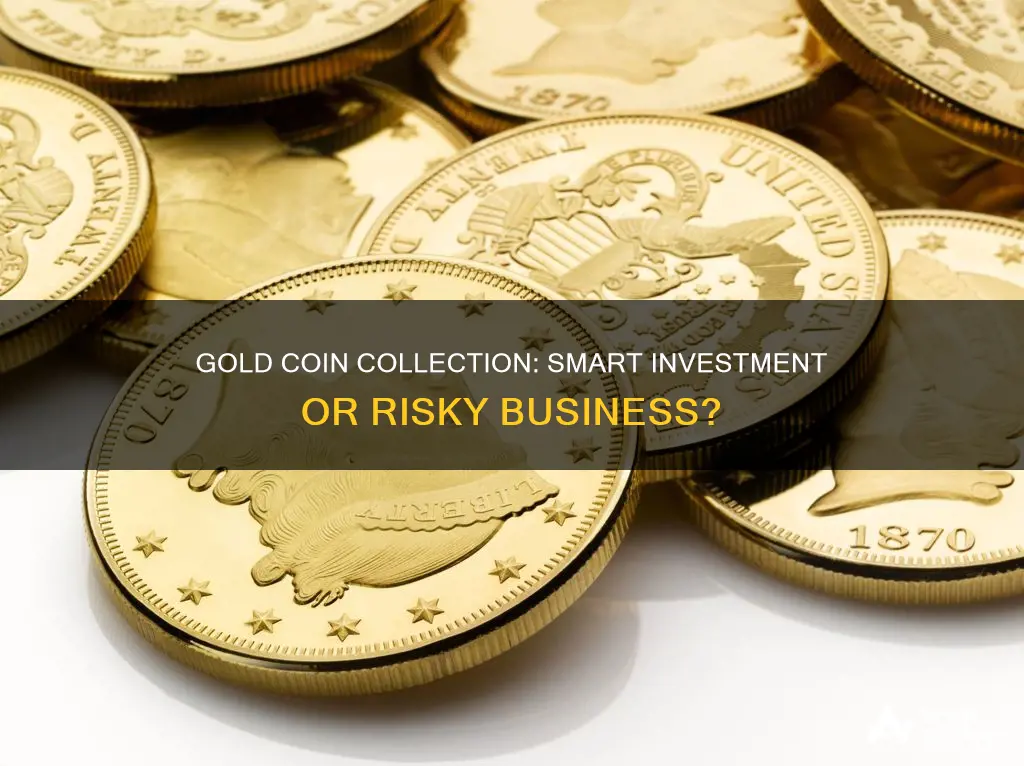
Gold coins are a popular investment option, but is it a good investment? Gold coins are often marketed as rare or numismatic gold, but there are several myths associated with these types of investments. One common misconception is that rare gold coins will increase in price due to their rarity and precious metal composition. However, retail markups are typically very high, and unless you purchase large quantities or are an expert in the field, you are more likely to lose money.
Another myth is that gold coins are highly liquid and can be easily sold at any time. In reality, the average investor often faces challenges when trying to sell gold coins, as they are more similar to expensive paintings or collectible jewellery in terms of market demand. Additionally, the resale value of gold coins is largely dependent on their worth as collectibles, rather than their metallic composition.
While gold coins may not be the most profitable investment option, they can still be a fun and exciting way to engage with history and appreciate numismatic art. If you are considering investing in gold coins, it is essential to do your research and consult with trusted experts or dealers to make informed decisions.
| Characteristics | Values |
|---|---|
| Initial Cost | Gold coins are expensive to buy because of the high refining costs, fabrication fees, and seignorage. |
| Storage | Gold coins are easy to store in a safe at home or a commercial safety deposit box, but this can be costly. |
| Insurance | Gold coins are easily sold, which makes them attractive to thieves and insurance fraudsters. |
| Selling | It can be difficult to receive the full market value for gold coins, especially if you need the money quickly. |
| Profit | To make a profit, buyers of physical gold rely on the commodity's price rising. |
What You'll Learn

Gold coins are expensive to buy
The markup on gold coins is so high because the refining process for gold is expensive. The economic refining process gets the purity to just over 99.5%, which matches the Good Delivery bullion specification. However, about half of all gold will be alloyed for jewellery manufacture, and most of the rest will be retained as stored bullion, so further refining to 99.99% is usually unnecessary. Nevertheless, consumers worldwide are increasingly demanding 99.99% gold coins, and they pay a premium for this. This process requires electrolytic refining, and the cost is passed on to the buyer.
On top of refining costs, gold coin manufacturers charge fabrication fees and/or seignorage – a fee covering minting royalties. These extra charges are passed on to the buyer.
Gold coins are also expensive to buy because of the high markups charged by dealers. Dealers make money on commissions, and the more products they sell, the richer they become. They charge more for gold-based products than the actual price of the metal. Brokers also love these vehicles because they make money on commissions and can push products with higher markups.
Gold coins are also expensive to buy because of the subjective value of rare coins. The premium for a numismatic coin is based on rarity, condition, historical significance, and demand. Different people value these aspects in different ways, so even if a coin is relatively rare and in good condition, if it isn't in high demand, its price won't rise.
Why You Should Avoid Dogecoin Investments
You may want to see also

Gold coins are not a good investment
High Transaction Costs
Gold coins are bought through traditional coin dealers with around 7 to 10 percent ‘spread’. That’s the difference between the dealers’ selling price and their buy-back price. This is a very high transaction cost for a modern investment.
Storage and Insurance Costs
Gold coins are easily sold, and they are attractive not only to thieves but also to insurance fraudsters. As a result, insuring gold coins can be expensive.
Risk of Forgeries
Fake coins exist, and small bars circulating in private ownership are known to have been filled with tungsten – a metal of similar density to gold.
Liquidity
Gold coins are not very liquid, and average investors often have great difficulty selling them.
Poor Investment Returns
Gold coins can increase in value, but retail markups are so high that unless you purchase huge lots or are an expert numismatist, you are likely to lose money.
Scams
Gold's value is based on fear, and dealers may push coins, bullion, or stocks in mining companies. Brokers love these vehicles because they make money on commissions. The more products they sell, the richer they become, especially when investor sentiment is skittish.
Small Bitcoin Investments: Are They Worthwhile?
You may want to see also

Gold coins are not easy to store
However, large safes can be easily spotted by thieves. If you go for the safe option, buy a couple of different safes and split your gold between them. That way, if one is stolen, you still have some of your stash left. One could also serve as a "dummy" safe and trick thieves into taking it, not knowing your most precious assets are hidden elsewhere.
Another option is to rent a safety deposit box at a bank. This is a personal storage locker that you can place your gold coins inside. The bank locks these boxes behind a thick vault door, providing extreme security. However, depending on the bank, expect your deposit box to cost between $25 and $150 per year. Banks do not insure items stored in their safety deposit boxes, so you may want to seek out property insurance as a safeguard.
Another option is to use a bullion depository. Independent coin and precious metal depositories have similar security to banks but, since they specialize in coins and similar items, know how to handle and store gold pieces properly. Look for a depository that lets you view or withdraw your coins with only one day's notice. Costs vary based on the depository you choose and how much gold you want to store.
Gold coins are also easily melted in a fire, or can be easily found by high-tech thieves who use metal detectors to locate hidden caches of coins and bullion.
Bitcoin Investment: What's in it for You?
You may want to see also

Gold coins are not liquid
Gold coins are not a liquid investment. Liquidity refers to how quickly an investment can be converted into cash. Gold coins are not very liquid because they are not easily sold, and it can be difficult to receive the full market value for them.
Gold coins are not easily sold because there is a small market for them. The rare coin market is tiny, with only a few potential buyers. This means that it can take a long time to find a buyer who is willing to purchase the coins at the desired price.
Even if a buyer is found, it can be difficult to receive the full market value for the gold coins. This is because the value of gold coins is subjective and based on many factors such as rarity, condition, historical significance, and demand. The price of gold coins can also be affected by the dealer's commission and the bid/ask spread. As a result, the seller may have to settle for a lower price than they had hoped for.
Another factor that affects the liquidity of gold coins is the need to safeguard and insure them. Gold coins need to be stored in a safe place, such as a safe deposit box or a home safe. This can add to the cost of owning gold coins and make it more difficult to sell them quickly.
Overall, gold coins are not a liquid investment due to the small market for them, the subjective value, and the need for safeguarding and insurance. These factors can make it difficult to find a buyer and receive the full market value for the coins, resulting in a loss of profit.
MrBeast's Bitcoin Investment: How Much Did He Risk?
You may want to see also

Gold coins are difficult to sell
Secondly, the value of gold coins is subjective and based on factors such as rarity, condition, historical significance, and demand. The premium for a numismatic coin is often based on these factors, and different buyers may value them differently. As a result, it can be challenging to determine a fair price for your gold coins and find a buyer who is willing to pay that price.
Thirdly, gold coins often come with high transaction costs. When selling gold coins, you may need to pay a commission or other fees, which can eat into your profits. Additionally, the spread between the buying and selling prices of gold coins can be significant, ranging from 7% to 10%. This means that you may lose a substantial amount of money when selling your gold coins.
Furthermore, the resale value of gold coins is not solely based on their gold content but also their worth as collectibles. The bulk of their resale value may lie in their numismatic or collector's value, which can be difficult to determine and highly variable.
Lastly, selling gold coins may require additional costs, such as insurance, a safe deposit box, or off-site storage. These costs can further reduce the profitability of selling gold coins. Overall, these factors contribute to the difficulty of selling gold coins and should be carefully considered by anyone thinking of investing in them.
Billionaires Who Have Invested in Bitcoin
You may want to see also







